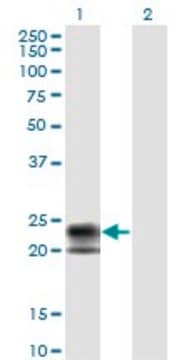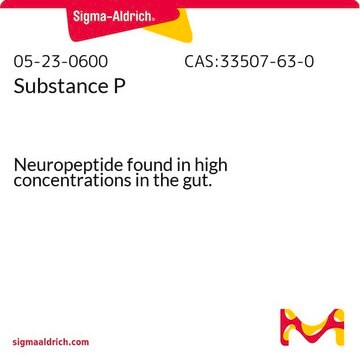SRP3010
BCMA human
recombinant, expressed in E. coli, ≥98% (SDS-PAGE), ≥98% (HPLC), suitable for cell culture
Szinonimák:
B-Cell Maturation Antigen, BCM, TNFRSF17
Bejelentkezésa Szervezeti és Szerződéses árazás megtekintéséhez
Összes fotó(1)
About This Item
UNSPSC kód:
12352202
NACRES:
NA.32
Javasolt termékek
biológiai forrás
human
rekombináns
expressed in E. coli
Teszt
≥98% (HPLC)
≥98% (SDS-PAGE)
form
lyophilized
molekulatömeg
5.3 kDa
kiszerelés
pkg of 20 μg
technika/technikák
cell culture | mammalian: suitable
szennyeződések
<0.1 EU/μg endotoxin, tested
UniProt elérési szám
kiszállítva
wet ice
tárolási hőmérséklet
−20°C
Géninformáció
human ... TNFRSF17(608)
Általános leírás
B-cell maturation antigen (BCMA) or tumor necrosis factor receptor superfamily member 17(TNFRSF17), a member of the tumor necrosis factor (TNF) receptor superfamily, binds to B-cell–activating factor (BAFF) and a proliferation-inducing ligand (APRIL). BCMA is expressed on mature B-cells and other B-cell lines. The human BCMA gene codes for a 184 amino acid type I transmembrane protein, which contains a 54 amino acid extracellular domain, a 23 amino acid transmembrane domain, and a 107 amino acid cytoplasmic domain. Recombinant soluble human BCMA is a 50 amino acid polypeptide (5.3kDa) comprising the TNFR homologous region of the BCMA protein.
Biokémiai/fiziológiai hatások
B-cell maturation antigen (BCMA) or tumor necrosis factor receptor superfamily member 17 (TNFRSF17) plays an important role in B cell development, function and regulation. BCMA also has the capability to activate nuclear factor-κB (NF-κB), janus kinase (JNK) and mitogen activated protein kinases (MAPKs). The protein is expressed in certain cancers like glioblastoma, chronic lymphocytic leukemia, Hodgkin lymphoma and multiple myeloma. It has a role in the maintenance of survival of long-lived plasma cells in bone marrow.
Szekvencia
AGQCSQNEYF DSLLHACIPC QLRCSSNTPP LTCQRYCNAS VTNSVKGTNA
Fizikai forma
Lyophilized with no additives.
Feloldás
Centrifuge the vial prior to opening. Reconstitute in water to a concentration of 0.1-1.0 mg/ml. Do not vortex. This solution can be stored at 2-8°C for up to 1 week. For extended storage, it is recommended to further dilute in a buffer containing a carrier protein (example 0.1% BSA) and store in working aliquots at -20°C to -80°C
Tárolási osztály kódja
11 - Combustible Solids
WGK
WGK 3
Analitikai tanúsítványok (COA)
Analitikai tanúsítványok (COA) keresése a termék sarzs-/tételszámának megadásával. A sarzs- és tételszámok a termék címkéjén találhatók, a „Lot” vagy „Batch” szavak után.
Már rendelkezik ezzel a termékkel?
Az Ön által nemrégiben megvásárolt termékekre vonatkozó dokumentumokat a Dokumentumtárban találja.
B cell maturation antigen, the receptor for a proliferation-inducing ligand and B cell-activating factor of the TNF family, induces antigen presentation in B cells.
Yang M
Journal of Immunology, 175(5), 2814-2824 (2005)
Christine M Coquery et al.
Critical reviews in immunology, 32(4), 287-305 (2012-12-15)
B cell maturation antigen (BCMA) is a tumor necrosis family receptor (TNFR) member that is predominantly expressed on terminally differentiated B cells and, upon binding to its ligands B cell activator of the TNF family (BAFF) and a proliferation inducing
P Rennert et al.
The Journal of experimental medicine, 192(11), 1677-1684 (2000-12-06)
A proliferation-inducing ligand (APRIL) is a ligand of the tumor necrosis factor (TNF) family that stimulates tumor cell growth in vitro and in vivo. Expression of APRIL is highly upregulated in many tumors including colon and prostate carcinomas. Here we
Han-Wen Huang et al.
Proceedings of the National Academy of Sciences of the United States of America, 110(27), 10928-10933 (2013-06-19)
Glycosylation, an important posttranslational modification process, can modulate the structure and function of proteins, but its effect on the properties of plasma cells is largely unknown. In this study, we identified a panel of glycoproteins by click reaction with alkynyl
J A Gross et al.
Nature, 404(6781), 995-999 (2000-05-09)
B cells are important in the development of autoimmune disorders by mechanisms involving dysregulated polyclonal B-cell activation, production of pathogenic antibodies, and co-stimulation of autoreactive T cells. zTNF4 (BLyS, BAFF, TALL-1, THANK) is a member of the tumour necrosis factor
Tudóscsoportunk valamennyi kutatási területen rendelkezik tapasztalattal, beleértve az élettudományt, az anyagtudományt, a kémiai szintézist, a kromatográfiát, az analitikát és még sok más területet.
Lépjen kapcsolatba a szaktanácsadással








